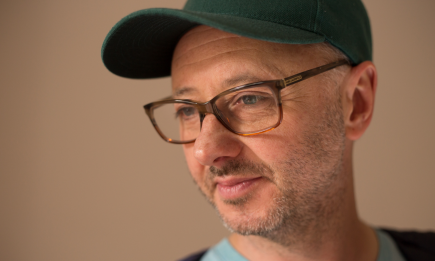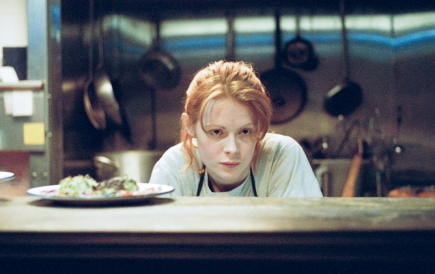Set in a gritty area of South East London, Daphne – a vivid character study from Peter Mackie Burns that’s soon to be playing at HOME – opens in a dimly lit bar in Elephant and Castle.
Its lead, played by Manchester born Emily Beecham, tells an old friend, ‘I’ve sort of given up on people, haven’t I?’ over the first of many tequilas she consumes that night.
Followed by a string of casual hook ups and some recreational drugs, it’s an instant insight into the complexity and three-dimensionality of our eponymous heroine.
Daphne – a cynical and promiscuous 31-year old-chef – is both a free-spirited party girl and an isolated misanthropic, probably not living the way she wants to be living and yet seemingly content with her hedonistic lifestyle.
She’s convinced herself that ‘healthy cynicism and neurotic cynicism are like, different’ whilst remaining wilfully ignorant to the fact her views on love (‘an illusion to bind us all together to propagate our shitty species’) amount to the latter.
She’s clearly on the verge of a much-needed change. The plot twist? Change does not come in the form of a man.
When Daphne witnesses a brutal stabbing during an attempted robbery in a run-down corner shop, it triggers a downward spiral of self-destructive behaviour.
With no one to talk to about the incident, she uses alcohol to self-medicate, exposing a layer of vulnerability beneath her anti-social façade.
 DIRECTOR: Peter Burns is the man behind Daphne
DIRECTOR: Peter Burns is the man behind Daphne
Director Peter Burns told MM: “She’s in a bit of a rut and she’s found an identity for herself which doesn’t fit her anymore.
“Essentially the film is asking ‘what do you do when you become the person you’re pretending to be?’”
The film poses this question with darkness and humour. A self-described ‘romantic comedy without the bullshit’, it skilfully avoids the typical tropes and clichés often used in rom-coms about an uninhibited female lead.
Daphne is uneasy with the lack of empathy she’s developed, but unlike Amy Schumer in Trainwreck for example, she knows settling down isn’t the answer to her existential crisis.
Refreshingly, Daphne portrays being a single woman in your thirties as a choice, putting to bed that Bridget Jones-eque myth that it’s some sad, tragic punishment for being a size 10, career-focused or having the sexual appetite ‘of a man’.
Burns explained: “We wanted to make a story where the central character was an accurate portrayal of women we know. Where a man didn’t come in and solve her problems.
“From my experience men don’t solve problems. They tend to make them!”
So, why are they almost always cast as the heroes in films?
 UNCONVENTIONAL: Daphne steps away from the Bridget Jones-esque narrative
UNCONVENTIONAL: Daphne steps away from the Bridget Jones-esque narrative
Burns explains that whilst the film industry is changing and other voices are being heard, it’s still a ‘heteronormative, conservative industry’ that’s been much slower than TV in creating realistic, less saccharine roles for women.
He said: “We came to the conclusion pretty quickly that the women that we know in our lives weren’t being seen on the big screen.
“So we thought, why don’t we try to make a movie where the central character is someone that we recognise and someone people can relate to? Women especially.”
Not everyone will see themselves in Daphne, but in creating a character of such depth and complexity, most women will identify with at least some aspects – such as ‘I’m still wearing a sports bra because I can’t be arsed’ – of her vivacious and witty personality.
Indeed, the film may have been written and directed by men but it’s overwhelmingly female – a reflection of both Beecham’s input into the character profile and her mesmerising execution of the role.
She’s in every scene of the 87 minute length feature, and as the director said: “If you like her, then you’ll like the film!”
Some reviews have described Daphne as unlikeable. This, to me, completely misses the point and serves to reflect how unaccustomed we are to seeing female characters who aren’t typically ‘nice’ or ‘kind’ on the big screen.
Daphne lives alone in an unglamorous area of the impersonal capital city. She’s stuck in a rut, having a mild identity crisis and has had one too many bad experiences on Tinder to believe that internet dating is anything more than ‘consumerism masqueraded as love’.
Her mum (played by Geraldine James) also has cancer. Given the circumstances, why the hell would she be nice?!?
For me, presenting us with a character who’s a little bit mean was not a plot device to make her intentionally unlikable but rather a way of making her recognisable, and by default, relatable.
Daphne is an authentic, funny take on modern city life and hopefully a sign that things are slowly but surely changing for portrayals of women in cinema.
*Daphne will be screened at Home, Manchester on Friday, September 29.



